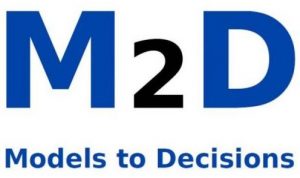Frequently Asked Questions
PI Salaries – what can I claim?
M2D Feasibility funding is not intended to support the (PI) salaries of academic faculty members on full time permanent contracts, nor as a “top-up fund” to an existing salary. We are willing however to consider exceptional circumstances. An example of such might be someone who is in between early career contracts and is using this as an opportunity to work up an application to a larger grant or fellowship scheme. If you feel you fall into this latter category, then make the funding request in your application with clear justification of your circumstances [current for the duration of the proposed project]
What can I claim funding for?
M2D Funding can be used to pay staff time i.e post-docs/research assistants (PIs as mentioned above), consumables, travel & subsistence, and some small equipment costs (not including computer workstations), all directly incurred by the study.
My project is computationally-intensive and I require a powerful computer, can M2D help?
The purchase of computer equipment (desktops and laptops etc.) unfortunately does not qualify as an eligible cost under EPSRC Terms and Conditions. Essentially, these costs are treated as overheads / bench fees. Therefore, we would expect the Host Institution to provide any necessary computer equipment.
Early Career Researchers – I’m currently a PhD Student, can I apply?
M2D Feasibility funding is not intended to support PhD research. However, PhD students may apply as Early Career Researchers if they can provide evidence that their PhD will be completed before the start date of the proposed M2D Project.
So what is the M2D definition of an Early Career Researcher?
Early career researchers are defined by M2D as individuals who are within eight years of the award of their PhD, or equivalent professional training, and who have yet to secure a permanent [academic] faculty appointment / fellowship. When applying to the Early Career Researcher Scheme, please be sure to show evidence and / or intention that, the [circa 3 month] project will contribute towards / lead up to a first grant or fellowship application.
Economic Costing – what can I apply for?
As part of your M2D Project Application you may request 100% of directly incurred costs (no overheads).
Can M2D fund Open Access publication costs?
Due to changes in RCUK funding rules, which took effect in April 2013, we are not able to fund publication costs from the M2D Grant. This is because UK Universities have now been given a central block grant by RCUK specifically in support of publication costs. Further information regarding RCUK Policy on Open Access can be found online here: RCUK Policy on Open Access
I’m a researcher working outside of the UK, can I apply to the M2D feasibility funding scheme?
M2D feasibility funding is only able to fund staff of UK based, RCUK eligible Institutions. However, this does not prevent you from collaborating with colleagues at such UK Institutions. One example of how this might work is that a Project Investigator (PI) at a UK (RCUK eligible) Institution might apply for funds to allow you to come and work for up to 6 months at their Institution (Pilot Project Scheme).
Other hints and tips includes include:
Please read the guidance notes carefully and ensure that your written proposal is no more than 2 pages long (including figures, references etc.).
The cover form is prescribed, but you are free to style and format your two-page proposal as you feel best / most appropriate.
To assist our multi-disciplinary (Engineering, Maths, Stats, Arts & Humanities, Management & Psychology, Philosophy & Social Science) Expert Panel team in reviewing your application, please do showcase the technical methodology and other technically relevant information, but make it clear in straightforward terms how your work fits in with the themes of the network and how it addresses the assessment criteria. Depending on the aims, method and scope of your project this might include:
- Experimental design – give as much description as you can / space will allow.
- Be clear about where the “uncertainty” elements are in your project and how you intend to address them.
Be clear to highlight the multi-disciplinary aspects of your project and where there is (ideally) end-user / project partner engagement. Projects that reinforce and further the aims of the M2D network, will be more favorably reviewed during the Expert Panel review process. As a reminder, some of these aims include:
- Identify ambitious multi-disciplinary challenges which can form an agenda for research in the area
- Develop a mechanism for sustained engagement with user organisations (government, industry, regulators, civil society) to analyse real world systems where multi-disciplinary research could be initiated or applied
- Enable multi-disciplinary collaborations which lead to novel research or approaches which are applied to real world decisions
- Demonstrate the value of multi-disciplinary research in addressing real world issues related to decision making under uncertainty and identify priorities for subsequent research initiatives in this area
- Encourage the two-way transfer of knowledge and expertise both between disciplines as well as between academia and user organizations.
Please also remember to clearly justify costs, clearly showing how each cost request specifically benefits the progression of your project.
